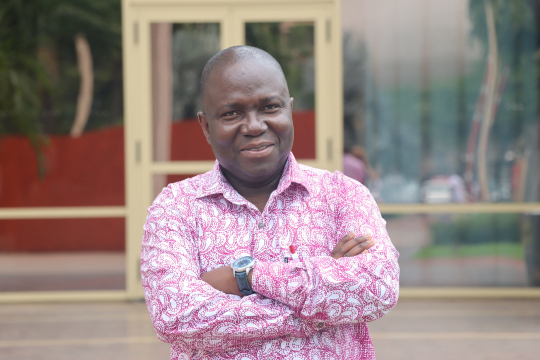Wisdom Akpalu, the Director of EfD Ghana embodies in many ways all the values that EfD strives for – high-quality research and a tangible impact on society. He is overjoyed to host EfD’s 17th Annual Meeting. “It’s like having my whole big family coming to my house”. And he is also happy about the visibility this event is giving to the EfD Ghana center, paving the way for even more impact.
The last months have been hectic for Wisdom Akpalu and his team in Ghana, preparing for the Annual Meeting. A hundred and seventy-seven (177) people including participants from the local organizing committee convene to take part in four intense days of sessions on current research, keynote presentations, and meetings in smaller groups.
Policy Day showed the significance of EfD
Four other events preceded the Annual Meeting, among them a Policy Day focusing on the fisheries sector. Researchers met with high-level civil servants such as the Deputy Minister of Fisheries and Agricultural Development, and many other stakeholders. The Policy Day attracted much attention from television, newspapers, and other media.
“Many of the policymakers and other stakeholders here know me very well and have heard of EfD Ghana, but they didn’t know much about its activities,” says Wisdom Akpalu.
“One representative from the Fisheries Alliance said he thinks I have been ‘underselling this organization’. This event showed them how significant EfD is, and it will definitely help our work even further.”
Gratifying to have impact on policies
After getting his Ph.D. at the University of Gothenburg in 2006 and then spending some years in the US among others, Wisdom Akpalu returned to Ghana. He says that he’s very happy to be back in Ghana as a part of EfD and to be able to contribute to the development of his country. He has spent a lot of time over the years engaging with policymakers which has resulted in very concrete measures from the policy side.
“It’s extremely fulfilling for an academic who started out doing very theoretical work, to migrate into the policy space and see that your work has an impact. The gratification of seeing such results is far greater than seeing your work published in a science journal,” he says.
A solution to decrease overfishing was implemented
“The people in the ministries are very open about how our work is supporting them and they contact us, asking us to work on issues that they are struggling with. We often disagree initially and the measures we suggest are often unpopular and can be difficult for the policymakers to implement. But in the end, we reach an agreement.”
Wisdom Akpalu has done several studies on the fisheries sector to address problems with unsustainable fishing practices, such as over-fishing. One measure that he suggested and has been advocating for a long time, is to install video surveillance on trawlers. This has been realized this year.
Subsidies are being misused
Another measure that is currently being discussed is to withdraw the subsidies on fishing fuel. The problem here isn’t only related to overfishing. Fishing fuel, called Premix, is a large part of the costs for the fishermen, and it’s currently being subsidized by about 60%. Wisdom Akpalu's estimates show that only about 20% of the subsidized Premix fuel actually goes to the fishermen. The distributors sell the rest for other purposes and make significant profits from the taxpayers' money.
“The ministry was not aware of the estimated leakages. Getting such information causes some panic within the ministry making them prioritize policies to address the problem,” says Wisdom Akpalu.
He will soon initiate a study to find out what fishermen would think about a withdrawal of the Premix subsidies. They would have to be compensated somehow, if it is withdrawn, maybe financially at first. In the long run, it will, however, according to Wisdom Akpalu, be necessary to find alternative occupations for some of the fishermen and their children who would most likely go in their parents' footsteps otherwise. This means providing training in other professions.
“Unpaid work pays off”
The work that is required to achieve impact requires a lot of patience and persistence, as well as social and communication skills. In addition, Wisdom Akpalu recommends researchers do unpaid work for relevant organizations.
How can one motivate researchers, that may already have a heavy workload to also do unpaid work?
“It may not pay off financially, but it gives you credibility within the ministries and among other stakeholders. You establish a connection with decision-makers and resource users that will help you get an influence in the future. Also, if you go to a ministry with a representative from an organization such as the World Bank or USAID, which is financing some of their work, they may be more willing to give you ‘sensitive’ data than if you come there as just any researcher,” says Wisdom Akpalu.
About EfD Ghana
EfD Ghana conducts policy-relevant research, grounded in local peculiarities and on a wide range of topics, with emphasis on coastal and mineral resource management, extractive industries, energy resources management, climate change, and green growth. It is hosted by the Institute of Statistical, Social and Economic Research (ISSER) at the University of Ghana (UG), and the School of Research and Graduate Studies (SRGS) at the Ghana Institute of Management and Public Administration (GIMPA).
